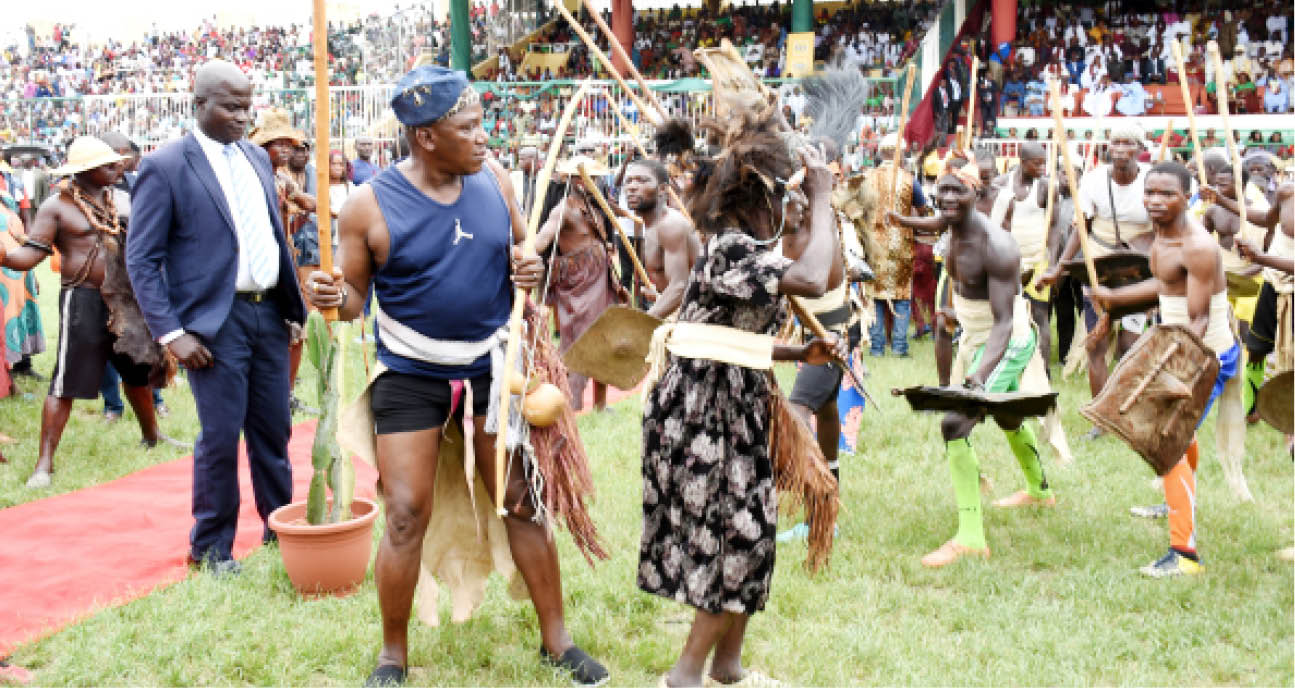There was colour and excitement last weekend as the Berom people proudly displayed their cultural attires, their dance steps and food. They cheerfully welcomed people from different ethnic groups to join in the annual Nzem Berom festival that ushers in the rainy season for the predominantly farming ethnic group of Plateau’s Northern Senatorial district. There were also bare-chested warriors, standing strong and looking intimidating as they guarded the Berom paramount ruler, Gbong Gwom Jos. Young boys, clad from waist down in animal skin robes, holding spares to showcase the bravery that is known among the Berom.
The annual week-long event had climaxed last Friday with a royal procession from the Gbong Gwom Jos palace to the Rwang Pam Township stadium where the people displayed traditional dances and exotic costumes. Food vendors made brisk money and the occasion caused a major gridlock in certain areas of the state capital.
The 2019 Nzem Berom, with the theme: “Celebrating the Berom Prowess in Science and Technology” also showcased the talents of Berom youths in science and technology with the display of different technological inventions.
Based on the calendar, the event had kickstarted with a Jumaat prayer on Friday, May 10th and was followed with a Christian prayer on Sunday, May 12th at the Church of Immaculate Conception, Zaramaganda, in Jos South. A Symposium was also held at the Langfield Leisure Park, Rayfield on the 14th and was quickly followed with a Women’s Special Day on the 15th. On the same day, the Zere Berom Beauty Pageant and fashion show took place, and on Thursday there was a Royal Banquet and welcome dinner at the Gbong Gwom’s Palace.
Dignitaries at this year’s event included the Speaker of the House of Representatives, Hon. Yakubu Dogara, who was Chairman of the occasion; Minister of Sports and Youth Development, Solomon Dalung; Former Governor Jonah David Jang; Brig. Gen. Florence Dung Gyang, members of the House of Representative and Assemblies, Commissioners as well as traditional leaders.
The Gbong Gwom Jos, Jacob Gyang Buba succinctly captured the mood of the 2019 occasion when he said the Long Pan of Qua’an Pan had told him that since the decision was made for this year’s Nzem Berom, there had been abundance of rain in Qua’an Pan in which they were grateful to the Berom people for their prayers.
The Gbong Gwom said the festival was aimed at praying to God for abundance of rain and abundance of harvest, adding that “we know that the rains have never failed us, but we have challenges and these challenges have to do with peace, because if there is no peace, nobody will be comfortable to go and farm.”
He further stated that, “those of us in the Plateau just as others, know the damages that have been visited upon us, the destruction of farms and the killing of our people. It is most unfortunate that villages have been destroyed and we have a large number of IDPs.”
The paramount ruler used the opportunity to call the attention of the National Emergency Management Agency (NEMA) and their state counterparts to come to the rescue of his people.
Minister of Development and Youth Development, Solomon Dalung, commended Berom people for sustaining the cultural festival and urged them to unite.
Dalung stated that the people of Plateau were known for their peaceful nature and hospitality and stressed that traditional and political leaders must invest their time in the promotion of peace and protection of their people.
Pam James Davou who was excited to be at the annual event told our correspondent that what makes the Berom people unique was their hospitality, as it is a thing of pride for the Berom people to show love to their visitors and honour them.
“A Berom person is somebody who has love for his brother and his neighbours. We always gather here every year so that we will receive blessings from God, our royal fathers and the elders, so that our farms can yield well,” he said.
Various local grains, tubers and vegetables were displayed at the cultural event. Tubers such as Kaffir potatoes, known as Vat in Berom and Rizga in Hausa, commonly eaten cooked or raw among the people, were on display. Other grains, including Fonio, which the people refer to as Chun in its original form, Cheles when processed, and Vwut when pounded were also on display.
Berom are one of the major producers of Fonio in Nigeria, which is consumed in different ways. Rachel Gyang who was at the food exhibition explained that Fonio is consumed in the form of Jollof, mixed with vegetables or boiled and eaten plainly with any soup of choice. “It is also prepared as ‘tuwon Acha’ or portage which we call tere or gwote. We make it rich, with vegetables and protein,” she said.

 Join Daily Trust WhatsApp Community For Quick Access To News and Happenings Around You.
Join Daily Trust WhatsApp Community For Quick Access To News and Happenings Around You.


